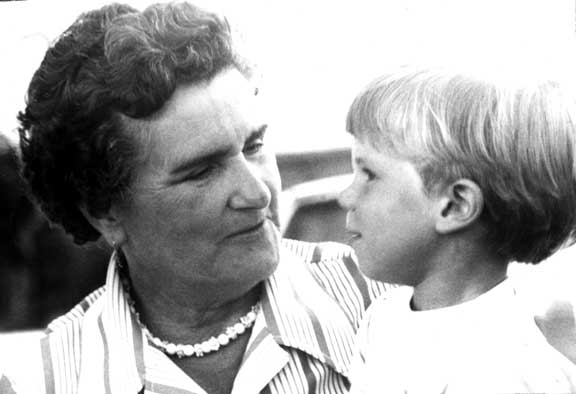| Grandmothers Part I | ||
 |
||
| FTLComm - Tisdale - February 7, 2001 | ||
| It is vital for us all to have roots, to establish an identity and feel that we are a part of a distinctive group. We as individuals can build our lives upon our heritage and the traditions that distinguish us from others. It seems that the role of grandmother is essential to this process. | ||
| Grandfathers pass on to their grandchildren their adventures and exploits, they tell of their achievements and as grandchildren we admire them and often revere them personally. But grandmothers take us all a step beyond their generation and extend our awareness to the family line and even the cultural heritage that we share. | ||
| The link from generation to generation preserved and passed on by our grandmothers
is quite remarkable because grandmothers do not go to grandmother school to learn
about how to transmitt the values of their family, clan and culture but rather is
a part of what they are. Their every action, comment and attitude is part of that
transmissive process that is absorbed by the grandchild and is the substance around
which they form their lives and their expectations. In some ways grandmothers will voice to their peers the awesome responsibility that is involved and they are quite aware of the important task they have, a task that is begun in the excitement of deciding to become a parent in the first place. From that moment onward they have to come to terms with not only the awesome task of raising a child but the added awareness that one day that child will have a child, her grandchild and she will somehow shoulder the burden of adding to that grandchild's life the complex elements that she received from her grandmothers.
Ruth had grown up as a bit of a tomboy with her six brothers and two sisters on a farm in South Eastern Saskatchewan. While her two sisters, one older and one younger concentrated on cooking, sewing and the mysteries of feminity, Ruth was a superior athlete, loved to play ball and could deal effectively with her boasterous and often brawling brothers. Her father came from Ontario as did her mother who had an Irish maiden name. It was this non-anglo-saxon imprint that would lent colour to her speech as she had a selective set of phrases that established that linage. Mist and light rain was referred to as "spicin' an rainin'", dust bunnies under a bed was referred to as "whoss". She was not interested in formal education in the one room school they all attended and shortly after she took up smoking in grade six she quit going to school. The importance of this fact is that from then on, until about the time the picture was taken above she was definitely hooked on smoking, but for Christmas of that year, realising her role as a grandmother, she made the extreme sacrafice and quit smoking, cold turkey, no excuses and no turning back. But what do grandmothers do that so shapes their grandchildren. Mostly it is indeed what they do, their lifelong role as wife, mother and now as grandmother seems to come instinctually as a person who is able to focus on the need to nurture. Family receipes, the foods of the season, the traditions of Christmas, Easter and all the other occassions of the year are not dependent upon radio, television and movies to set the tempo of life but she establishes the family traditions and everyone in the family recognises her authority and accepts her control of things through frowns, example and often direct explanation. One Christmas a son decided to go on a holdiay with friends instead of being at the family gathering. Dark clouds of extreme displeasure permiated the family that year as every member of the family was taught a lesson that being together at that time of the year was not only expected but there were to be no exceptions and their grandchildren will be informed of the same when the time comes. The vast array of information that come from a grandmother is mostly non-verbal but the effectiveness and long term affects of that information will not only last you for your life but for your children and indeed, their children. The most interesting aspect of this process is that when asked, few people know exactly why they do this or that, or what established this family tradition or an attitude, but careful examination will reveal that in most cases, you can track those things back to your grandmother and perhaps to her grandmother. |